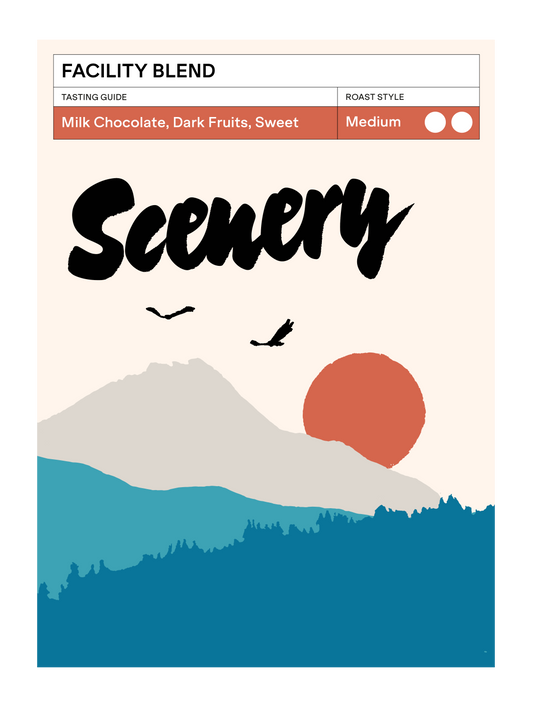This ultra-delicate and clean lot from Miguel was a great contrast to some bombastically process-heavy lots we had on the offer, but presented some challenges - not just benefiting from, but requiring several weeks of rest to show its true potential. Running from 05/06/2024 to 18/09/2024
We're keen to explore alternate processing pathways with a future Wush Wush lot from El Fénix for a future release...
We’ve been chomping at the bit to purchase a lot from El Fénix’s variety garden, having worked closely with the team at Raw Material for many years. El Fénix and the esteemed Miguel Fajardo are the source of the “anoxic water pillow” technique - a low cost high value add process which we’re huge fans of. In this lot, the low yielding and rare Wush Wush variety (an Ethiopian landrace named for the village it was discovered) has been carefully processed with a light touch to produce what we perceive to be an impeccably clean, sweet cup with floral nuance.
Brew Guide:
Best Brewed with: Filter
We found this coffee to have an elusive and bright spot for quality at the very lightest roaster influence - where the florals and silky complexity are at their peak.
Best rested for: 3-4 weeks.
Filter: Brew with 99c water, the softer the better, and we love giving a coffee like this a bit of a wider ratio - 1:18 for example - for a delicate and complex cup. As ever, taking it in short (1:15) will sacrifice some nuance for a bolder bit of fruit and concentrated acidity.
Espresso: Definitely rest this for a longer period. A turbo-shot is the name of the game - 18g in, 50-55g out, 15-20s for a shot of silky floral goodness.
We’re tasting: Aromas of jasmine and fresh lemon zest, quite akin to coffee blossom. The cup is super delicate and tea-like and reminds us of washed Ethiopian coffee - mandarin, physalis, gooseberry and elderflower, with a silky body. A little soft on hot, this coffee really opens up as it cools, with the sweetness of lemon iced tea.
Traceability:
Country of Origin: |
Colombia |
Region: |
Calarcá, Quindío |
Farm: |
Finca El Fénix |
Producer: |
Miguel Fajardo Mendoza |
Variety: |
Wush Wush |
Elevation: |
1680 - 1800 MASL (The Wush Wush plot is the highest elevation at El Fénix) |
Process: |
Anoxic Washed: Cherries floated & underripes skimmed, placed in a clean tank with a plastic sheet on top, which is then weighed down with cold water. This “water pillow” fermentation weight was used for a 24 hr in-cherry anoxic ferment with temperature control. Post ferment, the cherry is pulped, and the parchment is run through grading channels to both separate by density and scrub off mucilage. Clean parchment dried on raised beds over 2-3 weeks. |
Import Partner: |
Raw Material |
Harvest |
Crop 23/24, Arrived UK May 2024 |
The Story
Miguel Fajardo always had the intention to build a community wet mill, a centralised processing centre to allow producers to improve the quality of their coffee and access speciality markets and pricing. Many producers did not have the ability to dry coffee on their farms, and would sell “wet” parchment or cherry to onwards processors, at whatever commercial rate was given on the day. Those that had the facilities to dry and mill the coffee for export therefore had the most leverage. Allowing these companies to extract the value addition from processing the product for stable international export, and left the producers at the mercy of the local prices.
Miguel knew that if producers could learn to process and dry their coffee better, and had a community location to do so, the benefits would be manifold in the impact on producer’s livelihoods. He originally worked with his father, with the intention to build it on his father’s farm. This original project didn’t work out for various reasons, but through a chance encounter with Matt Graylee, one of the founders of Raw Material, an impactful partnership was formed.
Raw Material’s goal of maximum impact coffee went hand in hand with the idea of building a community wet mill, as well as developing a training centre and experimental farm. Matt and Miguel spent the next 3 years looking for the right land - the right altitude, conditions and a neighbouring community of farms that were at the time underserved in access to the international market.
When they found the spot - a farm once known as Finca El Brasil, in Calarcá, Colombia, they rallied the community of buyers and consumers who supported the work of Raw Material, and through a Kickstarter raised over 200,000 NZ$ to build the processing station and cupping lab at the newly born - Finca El Fénix . The phoenix rising from the ashes of the original wet mill project. As the project got into full steam, the access to processing equipment became better - farms started processing and drying their coffee on site, which reduced the need for the central wet mill. However, this raised the need for the secondary functions - El Fénix became principally a training centre and experimental farm. One of the biggest innovations and impacts to come out of El Fénix is the “water pillow anoxic” process - which is low cost but high value add, and has featured heavily in our buying from Raw Material as we’re big fans of the process.
The nuts and bolts of this process are simple, and are much alike using a fermentation weight when making a home lacto-ferment like sauerkraut or kimchi). Whole ripe cherries are added to an existing washing station tank, the tank is filled with water, and a clean sheet of plastic is placed over the surface. Cold, fresh water is added on top of the sheet, creating a seal and keeping the cherries underwater. The water acts as a temperature buffer - allowing the temperature of the fermentation to be modulated via the addition of hot or cold water refreshes, which in hot tropical climates allows extended fermentations for complexity without off-notes. The seal the plastic sheet makes creates an oxygen barrier, tilting the microbial population towards species that only thrive in anoxic environments, eliminating those that require the presence of oxygen, and changing the metabolic pathways of those that can survive in both oxygenated and anoxic environments. It’s a process that can be credited to Miguel and has been deployed worldwide at stations Raw Material works with. El Fénix is the home of an exotic variety garden - both breeding and preserving rare coffee varieties as well as conducting agronomic and processing experiments to get the very best out of them. The increased sales value of these lots helps support and pay for the El Fénix research and development.
Miguel has been tweaking the anoxic processing at El Fénix for years - the mucilage (fruit) of each coffee variety has a differing sugar content, and the profile of the varieties suit different fermentation lengths. In this case, the fermentation was very short - just 24 hours - leaving an impeccably clean cup that is variety driven. A rosado may complete its fermentation in 48 hours while some of the Gesha lots at El Fénix take 90.
The reason this lot is a brilliant chance for a clean cup exploration is the variety - Wush Wush, grown from the very highest elevation of the variety garden at El Fénix. An Ethiopian landrace named after the kebele in Keffa it was isolated from (much like Gesha is named after the Gori Gesha forest in Ethiopia), this variety is low yielding and suited only to the highest altitudes. What it lacks in bulk production, it makes up for in delicate and layered complexity. While there are certainly Wush-Wush lots out there that have more character from heavy handed processing, we selected this lot for its aromatic complexity and balance - with bright, bright acidity, citrus and florals that remind us of its motherland.

![[26] Colombia - El Fénix Wush Wush [CROP 23/24 ARCHIVE]](http://scenery.coffee/cdn/shop/articles/colombia_elfenix_shopify.png?v=1727428014&width=1100)



![Colombia - El Jaragual Espresso [24/25]](http://scenery.coffee/cdn/shop/files/colombia_el_jaragual_espresso.png?v=1715846837&width=533)



![Guatemala - Paya by Nery Pablo [23/24]](http://scenery.coffee/cdn/shop/files/guatemala_paya_24.png?v=1726133944&width=533)